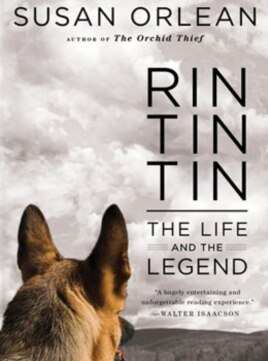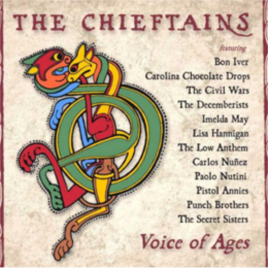
JUNE SIMMS: Welcome to AMERICAN MOSAIC in VOA Special English.
(MUSIC)
I’m June Simms. Today, we speak with writer Susan Orlean, who has a new book about the international dog star Rin Tin Tin…
We also play new music from The Chieftains…
But first a report on the groundbreaking ceremony for a new museum in the American capital.
(MUSIC)
Museum Groundbreaking
JUNE SIMMS: Many people have been working for years to develop a national museum specializing in African American art, history and culture. This week, organizers took a big step toward reaching that goal.
(SOUND FROM GROUNDBREAKING CEREMONY)
President Obama joined a crowd at the groundbreaking ceremony for the National Museum of African American History and Culture. Now crews will begin work on the project on the National Mall in Washington. Mister Obama spoke to the gathering on Wednesday. He called the planned museum, a crowning jewel for future generations.
PRESIDENT OBAMA: “When future generations hear these songs of pain and progress and struggle and sacrifice, I hope they will not think of them as somehow separate from the larger American story. I want them to see it as a central and important part of our shared story --- a call to see ourselves in one another.”
Congressman and former civil rights leader John Lewis spent years persuading Congress to approve the museum project.
REPRESENTATIVE JOHN LEWIS: “We must tell the story, the whole story, the four-hundred year story of African American contributions to this nation’s history from slavery to the present, without anger or apology.”
The National Museum for African American History and Culture is set to open in twenty-fifteen. The structure is expected to cost about five hundred million dollars. Thousands of historical objects will be shown at the museum, which is expected to get about three million visitors a year.
Lonnie Bunch is the museum’s director.
LONNIE BUNCH: “By helping to birth this museum so that everyone who visits will realize that we are all touched, shaped and enriched by African American history and culture all the day, everyday.”
Smithsonian officials say the new museum will go a long way in teaching about the African American experience.
Susan Orlean and Rin Tin Tin
JUNE SIMMS: Journalist and author Susan Orlean has written about lots of extraordinary men and women. She has shown special interest in people with unusual interests or who take part in exciting activities. And her latest book is no different, although this time it stars a dog, a very famous one. Christopher Cruise has our report on Susan Orlean and her new book “Rin Tin Tin: The Life and the Legend.”
CHRISTOPHER CRUISE: Susan Orlean has very clear memories of the dog called Rin Tin Tin. As a child, she watched the German Shepherd performing rescues in a television series. But she learned a surprising fact about the dog star years later. She was doing research for a magazine story about animals in film at the time.
SUSAN ORLEAN: “What I had thought was a 1950s television character had been a real dog with an extraordinary life story.”
Susan Orlean discovered that the real story of Rin Tin began in nineteen-eighteen. An American soldier named Lee Duncan rescued the German Shepherd from a World War One battlefield in France. He named the dog Rin Tin Tin after the dolls that French children gave American soldiers for good luck.

The soldier brought Rin Tin Tin back home with him when the war ended. Lee Duncan lived in California. One of his friends was a camera developer who filmed Rin Tin as he jumped over a fence during a dog show. The jump was very memorable because the fence was three and one half meters tall.
Susan Orlean says the cameraman sold the recording to a newsreel company without Lee Duncan’s knowledge.
SUSAN ORLEAN: “Lee knew nothing about it. All he knew was that a few weeks after the dog show, he got a check in the mail for this footage of Rin Tin Tin. That was the moment where he thought, wow, maybe there is something to this, maybe my dog could be in movies.”
In nineteen twenty-two, Rin Tin Tin appeared in his first movie. He played the part of a wolf in a silent film called, “The Man from Hell’s River.” He went on to star in more than twenty films, earning more than his human co-stars.
Rin Tin Tin’s career in Hollywood began to suffer after talking films arrived in the late nineteen twenties. But he continued to perform in lower budget films as did his descendants for many years.
(MOVIE SOUND)
Rin Tin Tin was also used in support of the military’s campaign for dog forces during World War Two. These animals, known as the K-Nine Corps, carried messages, helped guard bases and search for landmines. Susan Orlean says Rin Tin Tin brought good luck to the military effort.
The real Rin Tin Tin was the father of at least forty-four dogs. Thousands of dogs today are from his bloodline. Some continue Rin Tin Tin’s work in films and television industry. Others are involved in public service, like search and rescue, and working with the disabled. But all animal heroes like Rin Tin Tin have something to teach humans about goodness, says Susan Orlean.
SUSAN ORLEAN: “Loyalty, bravery, sympathy, empathy, and steadfastness that is appealing to people everywhere and doesn’t have a kind of national identity. Rin Tin Tin was uniquely that way. He was a German breed of dog, born on a battlefield in France, but became a star in America.”
The Chieftains “Voice of Ages”
JUNE SIMMS: The Irish musical group The Chieftains turns fifty this year. This week, the Chieftains released an album called “Voice of Ages.” It celebrates the group’s skill of mixing traditional Irish music with the sounds of today. Barbara Klein has more.
BARBARA KLEIN: “Voice of Ages” includes the work of many different artists. Listeners can hear the American country music band Pistol Annies on one song and the alternative rock group, The Decemberists, on another. Bon Iver, Secret Sisters and Carolina Chocolate Drops also perform.

Spanish bagpipe player Carlos Nunez was thirteen years old when he met Chieftain’s founder Paddy Maloney in the nineteen eighties. Nunez started to record and appear with the band soon after. On “Voice of Ages,” he and The Chieftains perform the lively song, “Lundu.”
(MUSIC)
“Peggy Gordon” is a folk song that may have Scottish roots. It tells about a man deeply in love with a woman who does not return the feeling. One beautifully worded part of the song goes like this:
I am so deep in love that I can't deny it
My heart lies smothered in my breast
But it’s not for you to let the world know it
A troubled mind can find no rest
(MUSIC)
The Chieftains perform “Peggy Gordon” on “Voice of Ages” with the help of the American country duo, Secret Sisters.
The Chieftains are currently performing in the United States. They have planned a special fiftieth anniversary show. It will take place in New York City on March seventeenth – Saint Patrick’s Day.
We leave you with The Chieftains and the Pistol Annies performing “Come All Ye Fair and Tender Ladies” from “Voice of Ages.”
(MUSIC)
JUNE SIMMS: We want to thank you for the continuing comments on our relationship blog. The problems and advice you have offered are greatly appreciated. We will talk to another relationship expert soon for advice on how to communicate better, solve disputes and deal with some other issues. So keep e-mailing your problems about dating, marriage, family, friends, work and school. Our e-mail address is mosaic@voanews.com. Write "Relationship" in the subject line. And please include your age, sex and country.
I’m June Simms. This program was written by Caty Weaver, with additional reporting from Chris Simkins and Mike O’Sullivan. Join us again next week for music and more on American Mosaic in VOA Special English.
(MUSIC)





